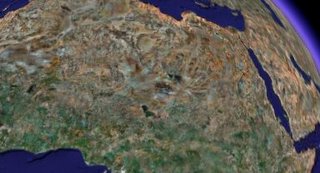By Science reporter Helen Briggs
Prehistoric humans roamed the world's largest desert for some 5,000 years, archaeologists have revealed. The Eastern Sahara of Egypt, Sudan, Libya and Chad was home to nomadic people who followed rains that turned the desert into grassland. When the landscape dried up about 7,000 years ago, there was a mass exodus to the Nile and other parts of Africa. The close link between human settlement and climate has lessons for today, researchers report in Science.
 Report from BBC News Science/Nature
Report from BBC News Science/Nature"Even modern day conflicts such as Dafur are caused by environmental degradation as it has been in the past," Dr Stefan Kropelin of the University of Cologne, Germany, told the BBC News website. "The basic struggle for food, water and pasture is still a big problem in the Sahara zone. This process started thousands of years ago and has a long tradition."
The Eastern Sahara, which covers more than 2 million sq km, an area the size of Western Europe, is now almost uninhabited by people or animals, providing a unique window into the past. The settlers left their mark with art. Dr Kropelin and colleague Dr Rudolph Kuper pieced together the 10,000-year jigsaw of human migration and settlement; studying more than 100 archaeological sites over the course of 30 years. In the largest study of its kind, they built up a detailed picture of human evolution in the world's largest desert. They found that far from the inhospitable climate of today, the area was once semi-humid.
Between about 14,000 and 13,000 years ago, the area was very dry. But a drastic switch in environmental conditions some 10,500 years ago brought rain and monsoon-like conditions. Nomadic human settlers moved in from the south, taking up residence beside rivers and lakes. They were hunter-gatherers at first, living off plants and wild game. Eventually they became more settled, domesticating cattle for the first time, and making intricate pottery.

No comments:
Post a Comment